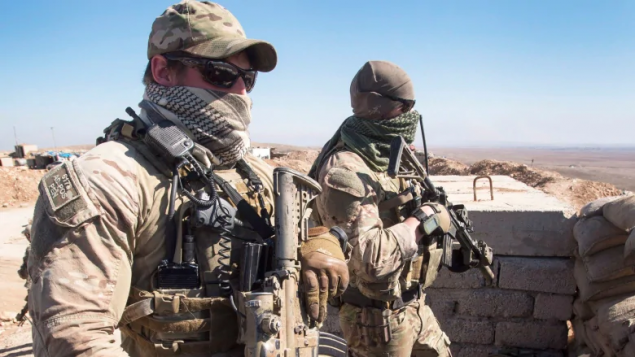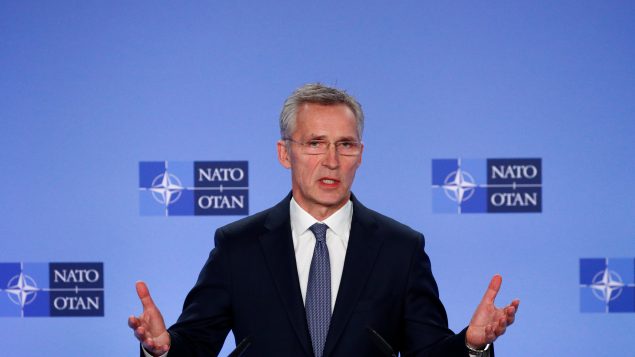NATO plans to stick around in Iraq and resume the alliance’s Canadian-led training mission of the country’s military, despite a recent parliamentary resolution calling for the withdrawal of all foreign troops, NATO Secretary General Jens Stoltenberg said Monday.
NATO suspended its training mission led by Canadian Maj.-Gen. Jennie Carignan following a U.S. drone strike that killed Iranian Gen. Qassem Soleimani and a top Iraqi militia commander in Baghdad on Friday.
Then on Sunday, Iraq’s parliament passed a non-binding resolution calling on the government to expel all foreign troops from the country.
‘Restraint and de-escalation’

Iranian people attend a funeral procession for Iranian Gen. Qassem Soleimani, head of the elite Quds Force, and Iraqi militia commander Abu Mahdi al-Muhandis, who were killed in an air strike at Baghdad airport, in Tehran, Iran Jan. 6, 2020. (Nazanin Tabatabaee/WANA via REUTERS)
Speaking to reporters at NATO headquarters in Brussels, Stoltenberg said that while the alliance is “taking all precautions necessary” to protect its troops in Iraq, it is ready to resume the training mission once the situation stabilizes.
The NATO Training Mission in Iraq is an important part of the efforts of the Global Coalition to defeat the so-called Islamic State or Daesh and to make sure that it is not able to return, Stoltenberg said following a briefing for the military alliance’s ambassadors.
“One of the best weapons we have in the fight against international terrorism is to train local forces, build local capacity, and that’s exactly what the coalition is doing and what NATO is doing through our training mission in Iraq,” Stoltenberg said. “We are there by invitation from the Iraqi authorities.”
Stoltenberg said he expects “to have close dialogue with the Iraqi government” over the coming days.
He also called for “restraint and de-escalation” after Iran vowed to avenge Soleimani’s death.
“A new conflict would be in no one’s interest,” Stoltenberg said. “Iran must refrain from further violence and provocations.”
Canadian presence in Iraq

Canadian special forces look over a Peshmerga observation post in Feb. 2017 in northern Iraq. (Ryan Remiorz/The Canadian Press)
Canada has about 500 troops in Iraq, said Capt. Leah Campbell, a spokesperson for Canadian Armed Forces (CAF).
About half of them, under Carignan’s command provide support to the NATO training mission in and around Baghdad, while other half, including elite Special Forces commandos, are based in northern Iraq under Operation Impact, Canada’s training mission in the Middle East.
“The CAF continues to monitor the situation across the Middle East and remain in close coordination with our NATO and coalition partners,” Campbell said.
Canada’s Foreign Affairs Minister François-Philippe Champagne discussed the situation in Iraq with his Iraqi counterpart, Mohammed Ali al-Hakim, officials at Global Affairs Canada said Monday.
Here is the readout of my call with my Iraqi counterpart. @Iraqimofa pic.twitter.com/RG05ZC3LRz
— François-Philippe Champagne (FPC) 🇨🇦 (@FP_Champagne) January 6, 2020
“The two ministers agreed that a de-escalation of tensions is necessary as peace and stability are key to pursuing the political and economic reforms underway in Iraq,” said a readout of the phone call between Champagne and al-Hakim.
Champagne also tweeted that he discussed the situation in Iraq with his Jordanian counterpart Ayman Safadi.
Just spoke to my Jordanian counterpart, @AymanHsafadi. We share the view that it is important that restraint be exercised by all parties and efforts continue to achieve de-escalation of tensions for the people of #Iraq and the region.
— François-Philippe Champagne (FPC) 🇨🇦 (@FP_Champagne) January 6, 2020
Canada has provided the Hashemite Kingdom with hundreds of millions of dollars in humanitarian and military assistance to help Jordanian authorities to care for over 660,000 registered Syrian refugees who have taken sanctuary in the country and secure its borders with Syria and Iraq against attacks by ISIS militants.
Given Canada’s limited airlift capability, Jordan’s relatively stable land border with Iraq could be a critical route for Canadian and other NATO forces if they need to withdraw from Iraq in case the security situation deteriorates even further.







For reasons beyond our control, and for an undetermined period of time, our comment section is now closed. However, our social networks remain open to your contributions.